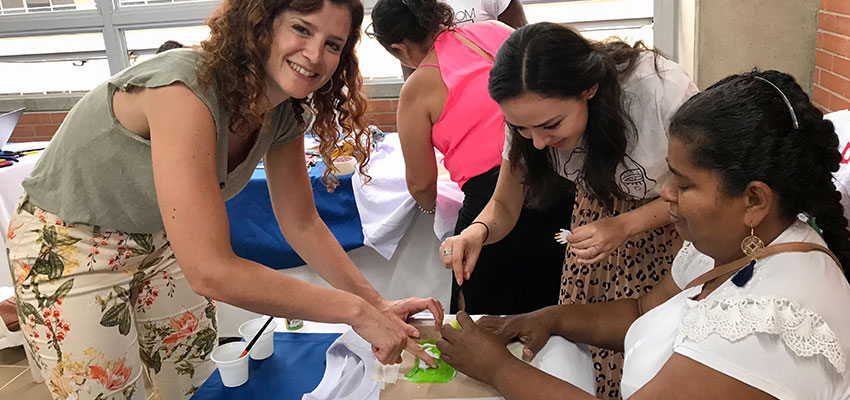
D-Lab’s fall term class D-Lab: Gender and Development provides opportunities for students to work with women working in the informal sector, including waste pickers and gold miners, developing and implementing projects that inspire solidarity, voice, and agency so that women living in poverty can mobilize and weigh-in on regulations that engender gender equity within their particular sector and develop work opportunities that allow them to better support themselves and their families.
The following blog post describes the very good work produced by D-Lab: Gender and Development Students from the 2018 class who conducted a needs assessment and then developed workshops to support women gold miners in their efforts to organize and launch women’s associations in Antioquia, Colombia.
This fall, students from the class will have the opportunity to organize associations of women gold miners in Peru and build a network of small to medium-sized waste sector businesses with women waste pickers in Bolivia. In January 2020, students will have the opportunity to travel to these countries to implement programs developed over the course of the term.
At the end of June 2019, three of us - Susana Tort, Sai Rajagopal and Anne Thibault freshly graduated from MIT, Harvard College, and the Harvard Kennedy School respectively – were on a plane heading to Medellín, Colombia, for what would become one of the most meaningful experiences of our year. Our group, led by MIT Lecturer Libby McDonald, who teaches D-Lab: Gender and Development and D-Lab: Inclusive Economies, would organize a three-day workshop in Medellín with a group of 21 women from the region of Antioquia who work as small-scale gold miners.
This workshop, titled “Leadership, Organizing and Action – Women & Subsistence Mining,” was the result of a semester of preparation, which initiated in fall 2018 as a D-Lab: Gender and Development class project. As part of that class, we first traveled to the region of Antioquia, Colombia in January to conduct a needs assessment of women working in the gold mining and coffee sectors. As we reported in a past blogpost, some of the most urgent priorities expressed by the women were to organize in order to increase their voice and bargaining power in the gold mining sector, and to diversify their businesses outside of coffee and mining to stabilize their income and reduce uncertainty.
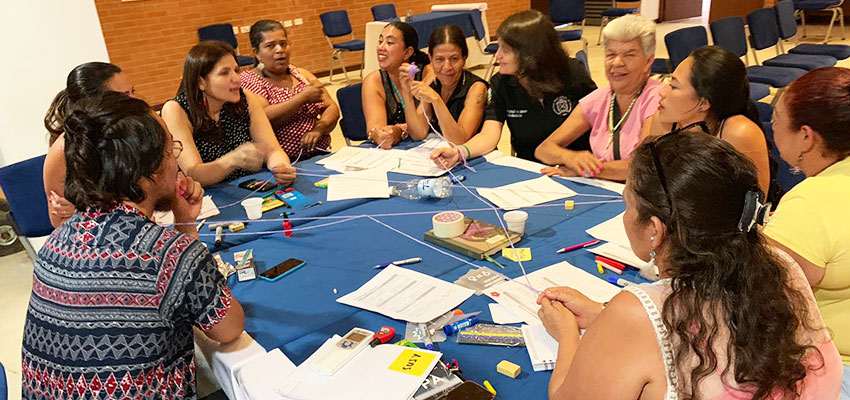
The workshop we implemented in July of this year was designed to support the women miners in these efforts. From July 2 to4, we partnered with Universidad Uniminuto, Universidad Nacional de Colombia, the consulting firm Asesorias Mineras SAS, and Mujeres de Oro – a program supported by USAID, the mining company Mineros S.A., and the consulting firm J&A Asociados – to hold a three-day workshop on Uniminuto’s campus in Medellín. Eleven women, small-scale miners from Santa Rita(some of whom had participated in the participatory needs assessment in January), and ten from the municipalities of Nechi, El Bagre, Caucasia, Taraza, and Zaragoza took part in the workshop. Four professors and students from Uniminuto, two students from Universidad Nacional, and the human rights lawyer Erika Gracia helped us as teaching assistants.
Day One: “Story of Self-Story of Us”
On the first day of the workshop, we focused on identifying the experiences and values that the women had in common in order to build a common purpose for collective action. We used the framework developed by Professor Marshall Ganz at the Harvard Kennedy School on public narrative, “Story of Self, Story of Us, Story of Now.” In the first step of this framework, participants identify their own personal story -- the “story of self.” Here we used D-Lab’s participatory approach to support the women in their efforts to identify the values and critical events in their lives that shaped their decision to become leaders in the mining sector. Participants asked questions and coached one another to identify the values they grew up with, their family story, the specific challenges that they faced, and significant choices that they made to overcome these challenges.
The second step was articulating the women’s common narrative: the “story of us.” Working in small groups, based on their stories of self, the women identified the types of experiences, values, and hopes that they shared. These experiences were overwhelmingly influenced by the violence of the Colombian conflict, most of them having suffered devastating domestic violence at an early age, gender discrimination, and limited economic opportunities. On the other hand, motherhood, their knowledge of mining ,and the search for economic autonomy and formal work were positive experiences that pushed them to move forward. As for the values that the women shared, many of them mentioned gender equality, the mining tradition of their ancestors, sorority, freedom, independence, resistance, patience, and faith in a better future for their children.
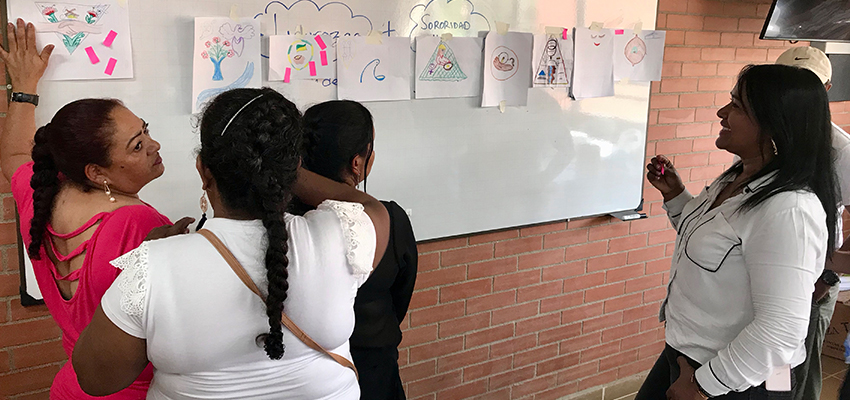
They aspired to a future free of violence and hunger, better economic opportunities, formalized women’s organizations ,and increase political participation in the decisions in and for their communities. We concluded the first day of the workshop by highlighting how the story of self and story of us can be a source of power, as it inspires connection with others and creates motivation for collective action.
Day Two: Leadership Development & Bargaining Skills
On the second day of the workshop, we focused on building specific women’s leadership skills through different practical activities. First, the women mapped their networks as a potential source of collective power. Working in small groups, they identified their personal and collective networks in seven areas: economic diversification, formalization of their mining activity, violence reduction, risk management in mining, equality of opportunities, education, and civic participation. Second, each group worked on a SWOT analysis, in which they reflected on their strengths and weaknesses -- areas in which they have a degree of control, and the opportunities and threats they face in their mining activities -- areas in which they may have less control.
In the afternoon, we organized an innovative role play activity to strengthen the women’s negotiation skills. We designed a simulation in which the participants had to either play the role of Maria, a community leader and subsistence miner, or the role of Alvaro, the owner of a mining company. Each pair of Marias and Alvaros had to meet to discuss the renegotiation of the price at which the mining company would buy the women’s gold extracted on their title, and reach an agreement. Through this role play activity, participants were introduced to basic negotiation concepts and discussed specific strategies to conduct negotiations in situations where there is an unbalance of power.
Day Three: Creating an Action Plan & Designing a Logo
On the last day of the workshop, we focused on converting the common values and purposes identified on day one, and new skills developed on day two into a concrete action plan. Working in small groups, organized by the regions in which the women worked and lived, they developed a concrete action plan to create an association of women miners. With the guidance of the lawyer Erika Gracia, each group had to define the concrete activities they would implement including convening other women in their respective communities to create the association, electing a board of directors, writing the association’s by-laws, and registering the association at the Chamber of Commerce.
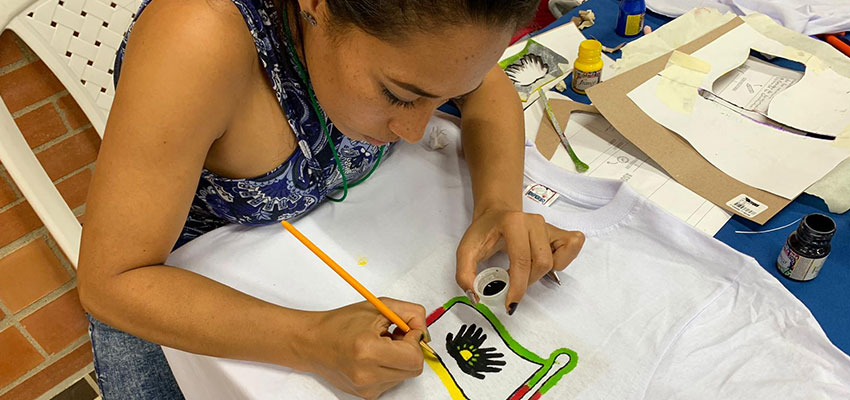
To conclude the workshop, the participants designed a logo that would become their association’s logo. They picked two common values with which they identified the most - leadership and sorority - and then created a symbol to represent these two values in their mining activity. After voting for the best design, they each painted the logo on a shirt that would become the symbol of their belonging to the women’s association.
Moving Forward
As next steps, we will work with MIT D-Lab’s local community partners, including Uniminuto, Mujeres de Oro, and Mineras S.A., to continue to support the women miners in the creation of their association and develop their creative capacity to diversify their work opportunities outside of the mining sector. In addition, we will work with D-Lab and future students in the Gender and Development class to develop a new framework that fuses Marshall Ganz’s organizing framework with D-Lab Creative Capacity Building methodology for supporting social movements led by women informal workers in developing countries.
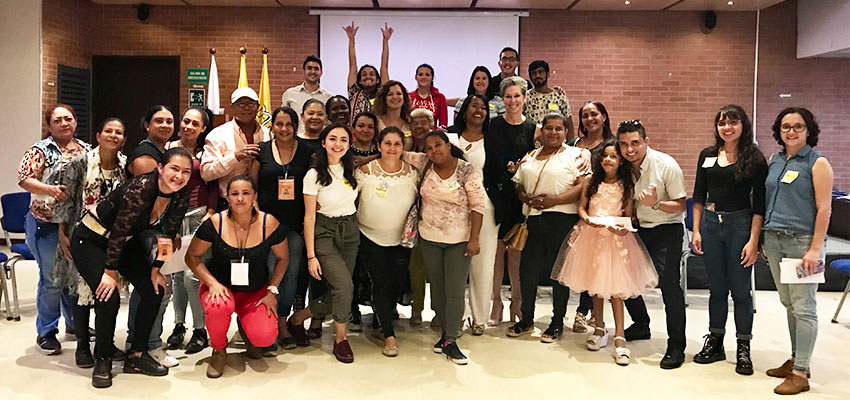
About the author
Anne Thibault was a student in D-Lab: Gender and Development in fall of 2018. She is a development specialist with over ten years of experience working in poverty alleviation and social policy in Latin America, who is currently working as a consultant in gender inclusion in agriculture at Root Capital. Prior to Root Capital, she worked for five years at the Abdul Latif Jameel Poverty Action Lab (J-PAL), a global research center founded at MIT, working to reduce poverty by ensuring that policy is informed by scientific evidence. As the Deputy Director of J-PAL’s Regional Office for Latin America and the Caribbean, she led the regional effort to promote evidence-based policy and build evaluation capacity among policy-makers and practitioners. Before J-PAL, Anne worked at the Chilean Ministry of Economy as the Advisor of the Executive Vice-President for the Foreign Investment Promotion Agency. From 2008 to 2011, she managed the strategic partnerships for a French-Chilean foundation specializing in job counseling for at-risk youth. Anne holds a Master in Public Administration from the Harvard Kennedy School, where she focused her studies on gender equity and inclusion. She also holds a Master from Sciences-Po Paris and a Master in Development and Humanitarian Assistance from the Université de Paris-Est Créteil.
More information
Contact
Libby McDonald, MIT D-Lab Lecturer and Inclusive Economies Specialist

